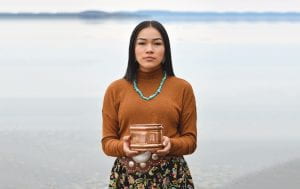Women and the Environment
Climate change is one of the greatest global challenges of the twenty-first century and it affects regions, generations, age, classes, income groups, and gender. However, the impact of climate change on gender is not the same, it impacts more those who are the most vulnerable and marginalized like women. According to the United Nations, women have less access compared to men to resources such as land, credit, decision-making structures, technology, training, and other services that would increase their ability to adapt to climate change. Women have always been part of making history but have historically also been underrepresented or excluded from important conversations and events. As primary caretakers of families, women play a critical role in managing natural resources and are often placed on the front lines of the environmental crisis; they are the most affected by environmental degradation. The impacts of climate change differ from pollution on pregnancy, the increase of gender-based violence to inequality such as the reduction of financial independence after extreme weather events (Fair, 2021). Environmental activism has become an important method used by women to urge governments and businesses to address problems regarding ongoing environmental damage. Expanding women’s access to productive resources can increase food security and reduce carbon dioxide emissions. The younger generation of activists is demanding change and accountability from their governments and communities to promote better environmental policies and actions (Middlehurst, 2021). They have been talking, marching, protesting, and donating more than the previous generation to make the movement louder and more reachable across the world, especially with social media being the main tool for outreach.
Due to the ongoing climate crisis, sustainability has become a priority for activists to rise up and speak in protests, during campaigns, and using their social media to encourage communities, organizations, or businesses to be more sustainable and limit their carbon emissions. For this reason, we want to honor the young women climate activists who launched a movement, who became voices to the voiceless bringing diversity, and perspectives to shape the future of our planet. Here we recognize a few amazing young women and their activism.

Wanjiku (Wawa) Gatheru ’20 (CAHNR) in the Student Union on April 9, 2019. (Sean Flynn/UConn Photo)
1. Wanjiku “Wawa” Gatheru, Founder of the organization Black Girl Environmentalist
Wanjiku Gatheru is an environmental justice advocate, writer and founder of #BlackGirlEnvironmentalist, a community of black girls/women environmentalists highlighting climate activists and organizers. She is also a first-generation American of Kenyan descent (East African) and first black woman to receive the Rhodes, Truman, and Udall scholarships (Sarah, n.d.). I discovered her on Instagram when she created #BlackGirlEnvironmentalist, and it was amazing to see the number of black women in the environmental field like me, because I can remember being the only black woman in all my classes. Similar to my experience, she noticed a lack of representation of BIPOC people and wanted to create an anti-racist climate movement where people of color can feel heard, seen, and build community with common passion or mission.
 2. Autumn Peltier, Chief Water Commissioner for Anishinabek Nation.
2. Autumn Peltier, Chief Water Commissioner for Anishinabek Nation.
Autumn Peltier is an Indigenous Anishinaabe water activist based in Canada. She comes from the Wikwemikong First Nation, located in the north-eastern section of Manitoulin Island in Ontario, Canada and is of Ojibwa/Odawa descent (NAAEE, n.d.). She advocates for clean drinking in First Nations communities where access to safe and clean water has always been a challenge, often due to faulty water treatment systems, lack of support from the government, and difficult access to water; some reserves are only accessible by plane (Cecco, 2021). She took interest in water due to her origins, where water is considered alive and that all humans come from water, but also because some indigenous communities have been on a boil-water advisory for over 10 years. In 2019, Autumn was appointed Chief Water Commissioner, the new “water walker” of the Anishinabek people and has spoken before the UN General Assembly for the launch of the International Decade for Action on Water for Sustainable Development and the UN Global Landscapes Forum (Gallant 2021). Autumn continues her work for access to clean water for the Indigenous Communities across the world.
 3. Greta Thunberg, Climate Activist
3. Greta Thunberg, Climate Activist
Greta Thunberg is a 19 year-old Swedish environmental activist well-known for protesting in front of the Swedish parliament in 2018 with a “ School Strike for Climate” sign to pressure governmental officials to take actions to reduce greenhouse gas emissions. The campaign inspired thousands of young people to strike for climate action in their own communities and countries. A year later, she was nominated for a Nobel Peace Prize for climate activism (Kraemer, 2021). Her activism has impacted people around her to adopt a sustainable lifestyle to reduce their own carbon footprint. She is also the founder of Fridays for Future, a youth-led climate strike movement of students who skip Friday classes to protest against the lack of actions from political leaders on the climate crisis. She has given speeches at major gatherings, including the World Economic Forum, the British Parliament, the U.S. Congress and, most recently, the United Nations Climate Change Conference (COP26), accusing leaders of stealing future generations’ futures and selling fairy tales without actions (Ottesen, 2021).
 4. Devishi Jha, UNICEF USA’s National Council & CEO of Voyagers
4. Devishi Jha, UNICEF USA’s National Council & CEO of Voyagers
Devishi Jha is an 18 year-old Indian-American activist, co-founder of Voyagers, a platform to help promote business sustainability, and Director of an international youth climate justice organization called Zero Hour. The fight against climate change was personal to her with her family in rural India being exposed to weather hazards due to monsoons. In an interview, she emphasized on her desire to innovate, create, and fight for a better planet, which is why she is engaged in connecting leaders to sustainable practices, giving speeches to the youth to promote environmental education, and making an important impact (The Conversationalist, n.d.).
A sustainable future is one that is able to maintain the prosperity of natural resources for future and present generations. Our world depends not only on the decisions made by political leaders but those made by corporate leaders and communities as well. Because women are more affected by the climate crisis, they play a key role in bringing ideas and enhancing societal well-being around the world, like the aforementioned climate activists. Gen Zers and Millennials are taking actions to address climate change through participation in a collection of activities. To support climate action for women, support local woman-led organizations and hold our leaders accountable to build an equitable and sustainable future. Sustainable development cannot be achievable without gender equality and equitable distribution of natural resources, which is why we must include gender equality and empowerment of women as a fundamental part of the 2030 Agenda for Sustainable Development.
Works Cited
Cecco, L. (2021). Dozens of Canada’s First Nations lack drinking water: ‘Unacceptable in a country so rich’. The Guardian. Retrieved from https://www.theguardian.com/world/2021/apr/30/canada-first-nations-justin-trudeau-drinking-water.
Fair, D. (2021). Issues of the Environment: Women’s History Month. WEMU89.1. Retrieved from https://www.wemu.org/issues-of-the-environment/2021-03-10/issues-of-the-environment-womens-history-month-michelle-deatrick.
Gallant, D. (2021). Autumn Peltier. In The Canadian Encyclopedia. Retrieved from https://www.thecanadianencyclopedia.ca/en/article/autumn-peltier
Kraemer, D. (2021). Greta Thunberg: Who is the climate campaigner and what are her aims?. BBC News. Retrieved from https://www.bbc.com/news/world-europe-49918719.
Middlehurst, M. (2021). Climate Justice and Gender Justice: An Essential Pairing to Get Resilience Right. National Democratic Institute. Retrieved from https://www.ndi.org/our-stories/climate-justice-and-gender-justice-essential-pairing-get-resilience-right.
NAAEE. (n.d.). Autumn Peltier. North American Association for Environmental Education. Retrieved from https://naaee.org/about-us/people/autumn-peltier.
Ottesen, K. (2021). Greta Thunberg on the State of the Climate Movement and the roots of her power as an activist. Washington Post. Retrieved from https://www.washingtonpost.com/magazine/2021/12/27/greta-thunberg-state-climate-movement-roots-her-power-an-activist/.
Sarah, R. (n.d.). Meet Black Girl Environmentalist founder Wanjiku “Wawa” Gatheru. Mighty Forces. Retrieved from https://www.mightyforces.co/blog/2021/2/5/pandemic-stories-meet-black-girl-environmentalist-founder-wanjiku-wawa-gatheru.
The Conversationalist (n.d.). Devishi Jha Environment Honoree. The Conversationalist. Retrieved from https://www.theconversationalist.com/blogs/environment-devishi-jha.


